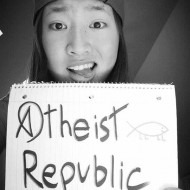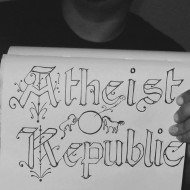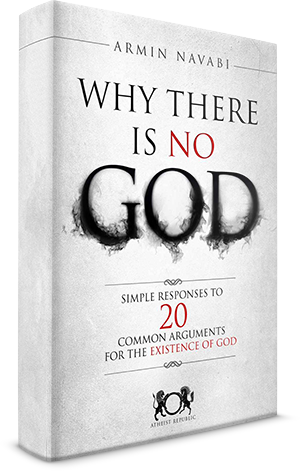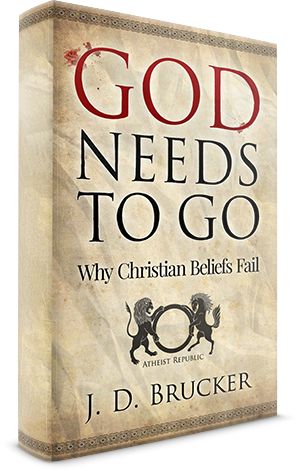Evolution has been attacked by theists for a very long time, mainly because it goes against their religious beliefs and not actual scientific reason for not accept evolution. My question is that why would theists go to such length to keep their personal beliefs in tact, even if it goes against facts and reality? What purpose does that serve and why would they sacrifice quality education for religious indoctrination?
Subscription Note:
Choosing to subscribe to this topic will automatically register you for email notifications for comments and updates on this thread.
Email notifications will be sent out daily by default unless specified otherwise on your account which you can edit by going to your userpage here and clicking on the subscriptions tab.




























Tman i have asked myself this same qestion many times but heres the answer ive come up with. The Theist like to belive and like the christian message that theres a "god" up there that has a plan, takes care of them, and created them as unique and special individuals. But they dont like the idea of being related to the common chimp because it goes against those reasons its says that life it governend by the survival of the fitest and says that they arent unique because they are so realted to a mammal.
What evidence has evolution theory got to prove the creation of the world that got a big bang?
I do not understand your question...
They sacrifice quality over fantasy because they are afraid of the retaliation of a god that would rather punish you for using your mind and questioning things, than reward you for being good without fear of punishment.That is how insane religion is, and how badly it makes people fear their so called benevolent god.
What I'm asking is that, How did the Space formed before the Big Bang that formed the world. Any evidence for that as an atheist? God created the Universe. Simple.
"God created the Universe. Simple"? No not really "simple" because that creates more questions that it does answers, for example where did this "god" come from? Where did this god get the materials from to created the universe? Why is there no evidence for this god? Also Space didn't form before the Big Bang, the Big Bang was the start for our universe.
To ask "what created God" is to assume that God was created in the first place. If you use this argument, you are not arguing against the Christian god, as He is not created. Also, this God doesn't require materials to create the Universe, He is omnipotent and created it out of the being of his own mind.
No evidence for God? Hardly. Can you give me a reasonable explanation for the creation f our Universe? Can you tell me what initiated life on our planet? Can you tell me why the Universe is so fine-tuned to allow life to exist? No. But I can, and science can essentially bolster what I say; it, in some senses, supports the existence of a divine being.
Similarly, to ask "what created the universe" is to assume the universe was created. A paraphrase of the law of conservation of matter is that matter can neither be created nor destroyed, only rearranged.
The universe is "fine-tuned to allow life to exist" by being hostile to life in the vast majority of its space. Reminds me of that bit from Douglas Adams: "Imagine a puddle waking up one morning and thinking, 'This is an interesting world I find myself in — an interesting hole I find myself in — fits me rather neatly, doesn't it? In fact it fits me staggeringly well, must have been made to have me in it!'"
"I might also add that you *cannot* claim the same for the Universe--that is is absolute, eternal, and without cause--because modern cosmology tells us that the Universe *did* have a beginning a some 13.75 billion years ago in a cataclysmic event known as the Big Bang."
I snuck this quotation from another thread when I realized you addressed this concern where I hadn't read at the time. Your assertion is by no means universally agreed upon. For example:
"I think the challenge we're raising is that the usual picture of the Big Bang is based on an assumption which is that time, space, matter, energy, everything began at the Big Bang," says Neil Turok, professor of mathematical physics at Cambridge University. "And that assumption was made in the 60s when people got the first strong observational evidence that the Big Bang happened. But it's really just an assumption and our point of view has come out of new development in physics which are enabling us to describe the behavior of matter in very extreme conditions such as were present around the Bang. And what we're seeing is that the Big Bang doesn't have to be the beginning of time. It's perfectly possible that the Big Bang was just a violent event in a pre-existing universe."
There could by cycles of big bangs and big collapses, and there are other alternatives that do not require such cycles. Just one example can be explored here:
http://www.dailygalaxy.com/my_weblog/2007/06/the_big_bang_no.html
Yet most modern cosmologists will not agree with this, for if time had already existed prior to the Universe, then why did the Big Bang happen when it did, and not sooner or later? Also, it has been proven that there are no spacial nor temporal dimensions prior to the Big Bang, for if there were, the Universe would essentially have always existed, and thus it would be infinite, but if it were infinite, then there would be an infinite amount of events leading up to the present, thus, you would never reach the present time.
Secondly, the physical laws that we observe are not and can not be applicable to any time before 10^-43 seconds after the Big Bang, because, as Michio Kaku and Stephen Hawking have both pointed out, our physics falls apart at this point. The physics we observe are *not* the same physics that existed (assuming that physics existed prior to this time, which is what you did, yet tell me not to assume the opposite) prior to one Planck time after the Big Bang. And most cosmologists observe and accept that the Universe was the beginning of spacial and temporal dimensions; spacetime. Space and time did not exist before the Big Bang, *literally nothing* existed before the Big Bang. To assume any different is merely speculation. We cannot describe the behavior of matter before the Big Bang because matter did not exist.
Thirdly, the oscillating model of the Universe cannot exist. The reasons why are brilliantly discussed by William Lane Craig at the following link, just look for the header "Oscillating models": http://www.reasonablefaith.org/the-ultimate-question-of-origins-god-and-...
"...why did the Big Bang happen when it did, and not sooner or later?"
You could ask that question about any event in history, and the answer is always the same: The reason it didn't happen sooner or later is that the conditions for it to occur (causes) weren't precisely conducive until that moment.
"Also, it has been proven that there are no spacial nor temporal dimensions prior to the Big Bang."
Hardly. Nothing can be proven at this time regarding any "prior to the Big Bang." Scientists readily admit to not knowing what, if anything, occurred prior to the Big Bang.
Real scientists of any worth will rarely speak in terms of "proof" but rather in terms of probability. Proof exists in mathematics, computer programming, and other environments where rules and inputs are strictly controlled.
"Space and time did not exist before the Big Bang, *literally nothing* existed before the Big Bang. To assume any different is merely speculation."
Of course it is merely speculation, but no more or less so than assuming literally nothing existed. We presently have no method to know either way.
Well, modern cosmology tells us that the Big Bang was the initial rise of space, time, and energy. This is to assume that these principles did not exist prior to the Big Bang, as almost any cosmologist believes. This fact goes to show that we, as humans, as scientists, cannot and will not know what existed before the Big Bang... at least if you're an atheist. However, the theist knows that it was God who existed before this moment, and He alone brought it about.
You could ask the same for any event in history, but this does not apply to the Big Bang, for we do not know what conditions caused it to happen, and those very conditions could have existed before the Big Bang along the temporal dimension, assuming (as you do) that time is infinite, which it is not; as I have stated before, if time were infinite, that would mean that an infinite number of events have passed from then until the present moment which means we would never reach the present moment because it would take an infinite amount of time to get here! Infinites don't exist in science because they cause paradoxes and contradictions.
Your modern cosmology is not really that modern. Science moves quickly (unlike religion which hasn't moved forward in thousands of years) and it can be tough to keep up. The idea of the Universe is *so* last decade :)
This latest Big Bang, which gives us the section of the multiverse we so archaically call the Universe, is just one isolated event in a vast array of Big Bangs that occur around us (in a manner of speaking, as they are actually happening very, very far away). The material that was compressed and exploded during this big bang had previously been part of prior big bangs. We're hurtling through space and will eventually be compressed in such a high pressure mass of matter that we will again explode, and then whatever life might be created from the resulting radiation will be equally as dumbfounded as to what the heck happened and how it's alive. It's a giant mishmosh out there, and we are basically only a blink it time.
How did this happen? Pure chance. Rinse and repeat enough times and it's inevitable that we'll see several unlikely outcomes, eventually. No one here knows how many times this has happened before, or how many times it will happen again, but it's highly unlikely any of us will live long enough for that to matter one iota.
Most cosmology is well over my head, honestly, being as I hate physics. But I have enough friends in the cosmology department to make my head spin with their conversations, I'll tell you that.
Anyway, wikipedia can fill you in on most of the current goings on. This *has* been discussed in another thread as spewer pointed out, if you're looking for verifiable sources.
It seems you're arguing for an oscillating model of the Universe. An oscillating model of the Universe does not work.
Firstly, it assumes the Universe is infinite, and has been undergoing these expansions and contractions for an infinite amount of time. If that were true, than an infinite amount of time would exist between any moment and the present moment, thus it would require an infinite amount of time to reach the present moment, therefore, you would never reach it.
Secondly, the Penrose-Hawking theorem states that the Universe must have an *initial* cosmological singularity: An absolute beginning. Also, the mean mass density of the Universe is not sufficient enough to actually halt and reverse the expansion of the Universe.
Stephen Hawking, while totally being a really cool guy, is *also* outdated. Sorry to burst your bubble.
not to mention though very intelligent guy who contributed a vast amount to science probably one of the worst winners of scientific bets out there. Just saying. he has lost many bets in relation to science I think he is up to loosing about one bet a year on average as things he bet continue to be disproved.
Stephen Hawking, along with Roger Penrose, Arvin Borde, Alexander Vilenkin, and Alan Guth are all highly distinguished names in science, and *all* of these men have scientifically shown us that the universe *is* past-finite.
Dude, I totally get distinguished names in science and all that. I'm a fan of Hawking, I really am.
But unfortunately, he's wrong about some things. No harm no foul on him though, he had the guts to go ahead and be wrong when no one else had any better answers.
But now we do. Even he will happily admit when he's wrong.
Unlike religion, you can't just read the books once and figure you know everything. It's constantly changing. I don't know what your background is, but if you've been in any dynamic academia for more than 5-6 years you're well accustomed to "facts" you previously knew being proven wrong on a regular basis.
Btw, there is quite simply no way I see that you could possibly be more wrong about science not including infinite principles.
That's pretty much the backbone of physics.
Actually, infinites do not exist in physics because they are contradictory and paradoxical, they only exist in mathematics. Michio Kaku has said himself that physics does not allow the use of an infinite. This is part of the reason we cannot, by physical means, describe the singularity of a black hole, because it is believed that gravity becomes infinite, which means that our physics doesn't work in the singularity of a black hole, thus we cannot describe nor explain it. Just as the example I use earlier, if the Universe (in any form or shape, including an oscillating model, which is what it looks like you've described) were infinite, then an infinite amount of events would exist between this moment and the beginning, and thus it would require an infinite amount of time to reach the present moment and, therefore, you would never get to the present moment *because* it takes an infinite amount of time to get to it! Research Hilbert's Hotel, it shows how infinites are contradictory and paradoxical.
The use, and the existence of, the infinite are two *entirely* separate things. There are many things that exist that are useless at the present time, or that we have simply not found the proper use for. Physics knows that infinites exist, yet the mathematical handling of infinity as a constant is not quite universally clear to us yet.
Dude, we have a symbol for it!
You should try examining the context before you walk away thinking you understand something.
An actually infinite number of events cannot exist. Hilbert's Hotel model explains this perfectly. You can subtract the same quantity from the same quantity, but get contradictory answers.
As for the existence of infinites in physics: Einstein's theory of general relativity breaks down in a singularity. It cannot describe the events of a singularity. Why? Because gravity becomes infinite. The laws of physics break down at singularities because they are the only known actual infinite in existence in our entire universe. If our laws of physics break down at an event, that event is physically inexplicable because our laws of physics entails every aspect of science.
Einstein had several versions of most of his famous theories, however only one version is taught in school, and therefore most people mistakenly walk around thinking that Einstein is somehow more elevated than the normal human, and he has the power to be right, while the rest of us only have the opportunity to learn from him. He himself disdained that blind respect, vocally. This happens all the time. How many people think they know a thing about chemistry, yet still somehow think that Bohr's atom is the way things *actually* look under a microscope?
And, here goes another version of his theory - they pop up from time to time, on crumpled napkins and such.
http://www.scientificamerican.com/article/einsteins-lost-theory-uncovered/
And obviously the flaw with Hilbert's Hotel is that infinity is undefined. If we could define it, it wouldn't be infinite, it would in the most fundamental essence of the word be finite! Of course the answers are contradictory, because they have not been defined and therefore could be anything, and a completely different anything at any time. Dude. The example is certainly proof of *something*, but I think you missed the point of it entirely.
The fact that the Universe had a beginning a finite time ago that cannot be explained by the physical laws implies that the Universe was created; but this does not by default constitute this creator being a divine and conscious being. And the Universe being hostile to life has nothing to do with it still allowing the formation of life. That's what we mean when we say fine-tuned. That various constants and quantities are the way they are to allow for life to be able to form in our Universe; whether it actually *does* form or not we cannot assume, but it has. And life has survived on our planet for 3.5 billion years so the space immediately surrounding our planet must not be hostile; then what makes it so different from the space 40 light years away?
And your saying that because we observe that life has formed in our Universe we, therefore, should not be surprised that it has formed. This is akin to the following: You are stood against a wall and 100 men with guns aim at you, shoot, but they all miss. You, according to the logic you used, would not be surprised that you survived for if you had not you wouldn't be around to observe that you had survived. Well this is nonsense! Anybody would be surprised if they survived. You also contradicted yourself. You say that the Universe is hostile towards life yet say that we aren't surprised to find that life exists; well if the Universe were truly as hostile to life as you claim, you *should* be surprised that life exists!
"You also contradicted yourself. You say that the Universe is hostile towards life yet say that we aren't surprised to find that life exists."
I'm having a hard time finding where I expressed any level of surprise or lack about whether life exists. What I was getting at is that the vast majority of the universe is hostile to life as we know it. Just doing a check of the dimensions versus ideal conditions will make this point obvious.
That doesn't mean there aren't places where life can exist. Of course there are, and we are living examples. My point was that these conditions are few and far between relative to the size of the known universe, which points away from the notion that the whole place is "fine-tuned" for life. Most if it isn't.
Actually, it bolsters that fact of fine-tuning, for it shows how rare life really is, and therefore, the fact the life exists, how it is unlikely that it arose by random chance since the Universe appears to be so hostile toward life. Fine-tuned doesn't say the Universe will force life to exist, it merely means that the constants and quantities of the Universe allow for life to form, whether life actually forms or not; it is still a possibility due to the fine-tuning.
There are conditions necessary and sufficient for life to exist. To say that these conditions have to be "fine tuned" by an outside agent is an unnecessary leap. Such conditions can be naturally occurring, in which case, life is likely to exist under these conditions. The fact that these conditions are relatively rare in no way implies that an outside agent is necessary.
To assume that the conditions necessary for life are a necessity is to assume the the Universe must have some how knew that life was going to form in it. That is how small the chances are. If the Universe had expanded faster by one part in million million million, it would have blown itself apart; any slower by one part in a million and it would have collapsed back in onto itself, thus, the Universe would never have existed in the first place. If you were to change any of the subatomic quantities such that electrons do not orbit atoms, protons and/or neutrons do not form nuclei, or so that specific elements necessary for life cannot form (the amount by which you'd need to change any of these quantities is smaller than one part in 10^105), then life would not exist. You mean to tell me all of this happened by complete and total random chance? Let's go back to the gun idea, but let's change it to match this. You are set against a wall and 1,000 men with guns are all aimed at you. There is a small (infinitesimally small, yet larger than life happening by random chance) chance that they will all miss, however, do you believe they will? No, you don't. Why not?
"To assume that the conditions necessary for life are a necessity is to assume the Universe must have some how knew that life was going to form in it."
There is no evidence that the universe has any sentience such that it could "know" anything. I certainly would never assume that.
"To assume that the conditions necessary for life are a necessity" is a tautology. A necessity is a necessity irrespective of whether you assume it.
"You mean to tell me all of this happened by complete and total random chance?" I never said that. If abiogenesis were driven by random chance, then your question would be valid, but it is not. Abiogenesis is a long process with many small incremental steps, all governed by the non-random forces of Natural Selection and chemistry.
But, abiogenesis, being the exact opposite of biogenesis, cannot be true at the same time biogenesis is true. Just as we cannot say that photons do and don't have mass at the same time. It's a contradiction in and of itself. By the way, the odds of a *single usable* protein forming by absolute random chance is 1 in 10^125. And that's only a *single* protein of the thousands needed for life. Also, proteins arew only one of thousands of aspects needed for life. You mean to tell me that you believe it all happened by random chance? I hardly believe so.
Pages